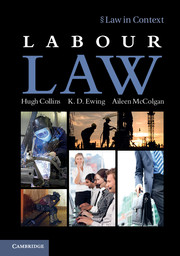Book contents
- Frontmatter
- Contents
- Preface
- Acknowledgments
- Table of cases
- Table of statutes
- Table of statutory instruments
- Table of European Union instruments
- Table of ILO instruments
- Table of other international instruments
- Abbreviations
- Part I Introduction
- Part II The contract of employment
- Part III Statutory regulation of the employment relationship
- 7 Wages
- 8 Working time
- 9 Equality
- 10 Work/life balance
- 11 Civil liberties at work
- Part IV Collective labour rights
- Part V Termination of employment
- Index
- References
8 - Working time
from Part III - Statutory regulation of the employment relationship
- Frontmatter
- Contents
- Preface
- Acknowledgments
- Table of cases
- Table of statutes
- Table of statutory instruments
- Table of European Union instruments
- Table of ILO instruments
- Table of other international instruments
- Abbreviations
- Part I Introduction
- Part II The contract of employment
- Part III Statutory regulation of the employment relationship
- 7 Wages
- 8 Working time
- 9 Equality
- 10 Work/life balance
- 11 Civil liberties at work
- Part IV Collective labour rights
- Part V Termination of employment
- Index
- References
Summary
Introduction
Until the Working Time Regulations 1998, there was no general framework of legislation in the United Kingdom dealing with working time. But this does not mean that there is no tradition of statutory regulation. For many years, we had legislation setting limits on the hours of work for those engaged in certain occupations, such as coal-mining and road transport. We also had legislation regulating the working time of women and young people in factories, with the (now repealed) Factories Act 1961 making fairly detailed provision for a maximum nine-hour day, a maximum forty-eight-hour week, and rest breaks of at least half an hour after a maximum of four-and-a-half hours work. And we also had legislation authorising trade boards (subsequently renamed as wages councils) to regulate working time in the various different industries in which they were established. Otherwise, working time would be governed by collective agreements negotiated between employers and trade unions, with collective agreements having very high levels of coverage in the period between 1946 and 1979 in particular.
The Working Time Directive 93/104 (‘the Directive’) and the Working Time Regulations 1998 (‘the Regulations’) are, however, now the focus of attention. But before examining aspects of these instruments, we should not overlook that the law of working time contains many other dimensions discussed in other chapters of this book. Thus, by virtue of the ‘statement of written particulars’ issued under ERA 1996, employees have a right to be informed about the hours they are required to work under their contract. Secondly, employees will have rights relating to working time under the terms of their contract (relating to hours, overtime, shifts and holidays), which admittedly may be difficult to enforce, but which nevertheless may have implications for the law relating to redundancy and unfair dismissal. And thirdly, employees may have statutory rights affecting working time other than those provided in the Directive and the Regulations. These include the rights to maternity, paternity and parental leave, as well as the rights to time off for trade union activities and trade union duties, and the rights to time off for union learning representatives. These various provisions relating to working time should be kept in mind in order to capture a full picture of working time regulation.
- Type
- Chapter
- Information
- Labour Law , pp. 266 - 310Publisher: Cambridge University PressPrint publication year: 2012



